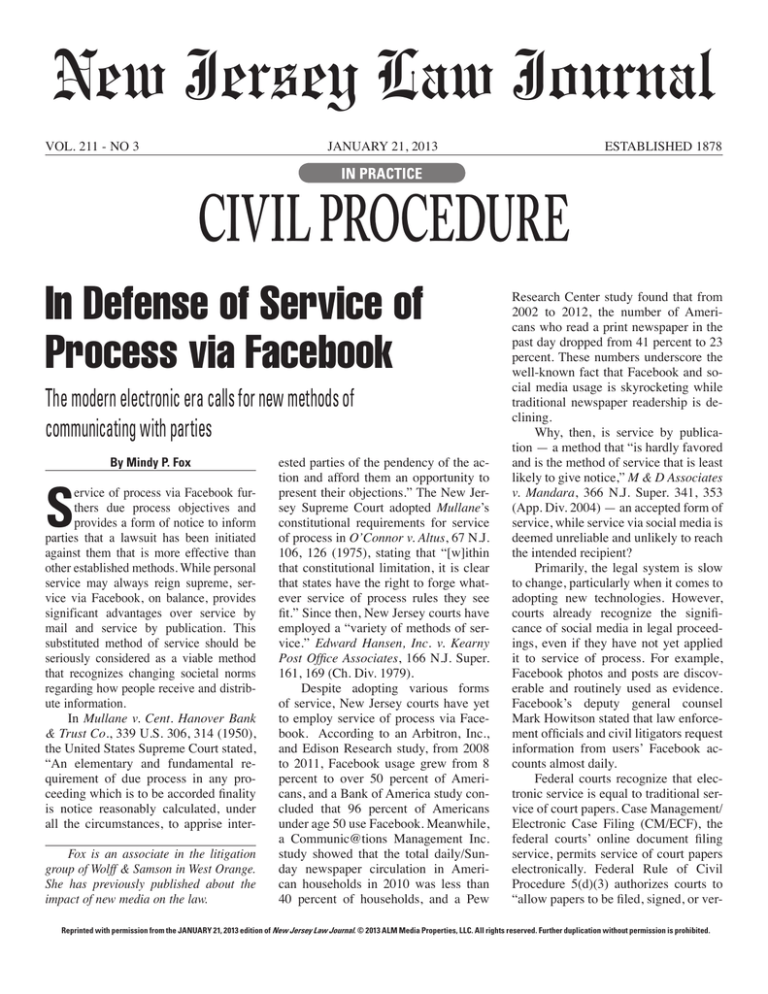
New Jersey Law Journal
VOL. 211 - NO 3
JANUARY 21, 2013
ESTABLISHED 1878
CIVIL PROCEDURE
In Defense of Service of
Process via Facebook
The modern electronic era calls for new methods of
communicating with parties
By Mindy P. Fox
S
ervice of process via Facebook furthers due process objectives and
provides a form of notice to inform
parties that a lawsuit has been initiated
against them that is more effective than
other established methods. While personal
service may always reign supreme, service via Facebook, on balance, provides
significant advantages over service by
mail and service by publication. This
substituted method of service should be
seriously considered as a viable method
that recognizes changing societal norms
regarding how people receive and distribute information.
In Mullane v. Cent. Hanover Bank
& Trust Co., 339 U.S. 306, 314 (1950),
the United States Supreme Court stated,
“An elementary and fundamental requirement of due process in any proceeding which is to be accorded finality
is notice reasonably calculated, under
all the circumstances, to apprise inter Fox is an associate in the litigation
group of Wolff & Samson in West Orange.
She has previously published about the
impact of new media on the law.
ested parties of the pendency of the action and afford them an opportunity to
present their objections.” The New Jersey Supreme Court adopted Mullane’s
constitutional requirements for service
of process in O’Connor v. Altus, 67 N.J.
106, 126 (1975), stating that “[w]ithin
that constitutional limitation, it is clear
that states have the right to forge whatever service of process rules they see
fit.” Since then, New Jersey courts have
employed a “variety of methods of service.” Edward Hansen, Inc. v. Kearny
Post Office Associates, 166 N.J. Super.
161, 169 (Ch. Div. 1979).
Despite adopting various forms
of service, New Jersey courts have yet
to employ service of process via Facebook. According to an Arbitron, Inc.,
and Edison Research study, from 2008
to 2011, Facebook usage grew from 8
percent to over 50 percent of Americans, and a Bank of America study concluded that 96 percent of Americans
under age 50 use Facebook. Meanwhile,
a Communic@tions Management Inc.
study showed that the total daily/Sunday newspaper circulation in American households in 2010 was less than
40 percent of households, and a Pew
Research Center study found that from
2002 to 2012, the number of Americans who read a print newspaper in the
past day dropped from 41 percent to 23
percent. These numbers underscore the
well-known fact that Facebook and social media usage is skyrocketing while
traditional newspaper readership is declining.
Why, then, is service by publication — a method that “is hardly favored
and is the method of service that is least
likely to give notice,” M & D Associates
v. Mandara, 366 N.J. Super. 341, 353
(App. Div. 2004) — an accepted form of
service, while service via social media is
deemed unreliable and unlikely to reach
the intended recipient?
Primarily, the legal system is slow
to change, particularly when it comes to
adopting new technologies. However,
courts already recognize the significance of social media in legal proceedings, even if they have not yet applied
it to service of process. For example,
Facebook photos and posts are discoverable and routinely used as evidence.
Facebook’s deputy general counsel
Mark Howitson stated that law enforcement officials and civil litigators request
information from users’ Facebook accounts almost daily.
Federal courts recognize that electronic service is equal to traditional service of court papers. Case Management/
Electronic Case Filing (CM/ECF), the
federal courts’ online document filing
service, permits service of court papers
electronically. Federal Rule of Civil
Procedure 5(d)(3) authorizes courts to
“allow papers to be filed, signed, or ver-
Reprinted with permission from the JANUARY 21, 2013 edition of New Jersey Law Journal. © 2013 ALM Media Properties, LLC. All rights reserved. Further duplication without permission is prohibited.
211 N.J.L.J. 162
NEW JERSEY LAW JOURNAL, JANUARY 21, 2013
ified by electronic means,” and explains
that “[a] paper filed electronically in
compliance with a local rule is a written
paper for purposes of these rules.” Similarly, Rules 5(a) and 5(b)(2)(E) together
allow the electronic delivery of pleadings
and papers if the person consents to it in
writing. Further, notices of class action
settlements have often been disseminated
through email, and the Northern District
of California, in Lane v. Facebook Inc.,
2010 WL 9013059 (N.D. Cal. Mar. 17,
2010), even approved a notice regimen
incorporating email plus internal Facebook messages.
Service of process via Facebook
should be considered a viable option
based on the purposes of due process, the
prevalence of social media vis-à-vis the
decline of traditional media, and the slow
permeation of new media into litigation.
First, such service is targeted to reach
the intended recipient. By examining a
person’s public information, which may
include hometown, birthday, employer,
college, photographs, friends and wall
posts, it is possible to determine, with
at least some semblance of accuracy,
whether a profile corresponds to the intended person.
Yet authentication issues remain a
fear. In Fortunato v. Chase Bank USA,
N.A., 2012 WL 2086950 (S.D.N.Y. June
7, 2012), Judge Keenan rejected the defendant/third-party plaintiff’s request to
serve a third-party defendant via Facebook, stating that the defendant/thirdparty plaintiff “has not set forth any
facts that would give the Court a degree
of certainty that the Facebook profile its
investigator located is in fact maintained
by [the intended third-party defendant].”
While this case may be read broadly to
disfavor service of process via Facebook
in its entirety, it really highlights the need
for a party seeking to serve process via
Facebook to provide the court with some
basis connecting the intended recipient
of service with the Facebook profile.
The information contained in a Facebook profile is excessive proof of identity
as compared to other methods of service.
For example, an address for personal
service or service by mail could be outdated, incorrect or belong to someone
with the same name. For service of process by publication, the geographic area
of publication could be wrong, or even
more likely, the intended recipient may
never read the newspaper containing the
notice. As compared to other methods, a
Facebook profile offers significant information about its owner, and the potential
that the profile belongs to the wrong person or is an impersonation is outweighed
by the other positive factors.
Moreover, social media is an interactive platform. Although it is not possible to know if a recipient of mailed
pleadings ever came into contact with
those papers, and while it is impossible
to know whether a party served by publication ever read the newspaper, let alone
the page with the notice, it is very possible to determine, with some degree of
likelihood, whether a person received
process via Facebook. It is reasonable to
conjecture that if a Facebook user posts
to his or her profile after the pleadings
were sent, then more likely than not, the
user received process.
Courts in other countries have allowed service of process by social media. In 2008, an Australian court in MKM
Capital v. Corbo and Poyser approved
an application to use Facebook to serve
legally binding documents notifying
a couple that they lost their home after
defaulting on a loan. The court authenticated the identities of the defendants by
noting that they friended each other and
by examining their public information,
which corresponded to the information
in the loan application.
In February 2009, a Canadian court
in Knott v. Sutherland allowed service
2
on a defendant by sending a notice to his
Facebook profile in addition to publishing it and sending it to his former employer. In March 2009, a New Zealand
court in Axe Market Gardens v. Axe allowed notification by email and notice
of that notification “provided to the defendant on his Facebook site, which
[the judge] underst[ood] is known to the
plaintiff.” In September 2009, a court in
the United Kingdom permitted an injunction against an anonymous blogger to be
served via Twitter.
In May 2011, a Minnesota state
court in Mpafe v. Mpafe, recognized the
ineffectiveness of service by publication and gave the petitioner the option
to effect service via Facebook. The court
explained, “While the Court considered
publication in a legal newspaper, it is
unlikely that Respondent would ever see
this.” The court also stated, “The traditional way to get service by publication
is antiquated and is prohibitively expensive.” The court ordered, “Petitioner may
choose the format in which they believe
it is most likely that Respondent will receive notice. This may include but is not
limited to ... [c]ontact via any facebook,
myspace, or other social networking
site.”
The power to serve via Facebook
will require added responsibility. Obtaining court permission for service via Facebook should require an affidavit setting
forth the basis for the movant’s belief
that a given Facebook profile belongs to
an intended defendant. The serving party
should also be required to inform the defendant about how to verify the filing of
the lawsuit with the relevant court.
Due process demands that the court
provide a plaintiff with the means necessary to best give notice of a claim to a defendant. Service by social media is a new
opportunity to re-energize that timeless
goal and should be strongly considered
as a viable method of effecting service.

